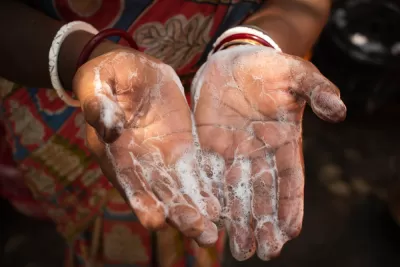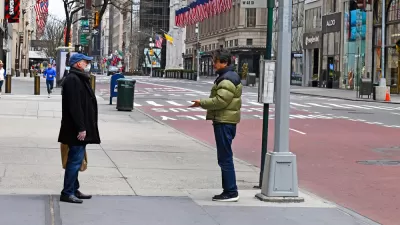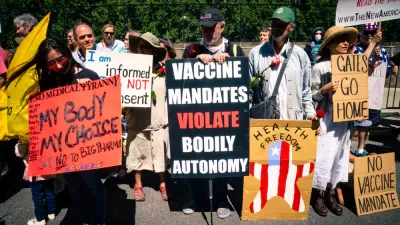Most utilities in the United States have committed to protecting the supply of water for people struggling to pay the bills during the coronavirus.

"Millions of Americans risk losing running water if they fall behind with bill payments in coming months, as mass layoffs triggered by the coronavirus pandemic force families to make impossible tradeoffs on paying household expenses," writes Nina Lakhani.
Data analyzed by Food and Water Watch (FWW) and the Guardian estimates that two-fifths of the country relies on water from utilities that haven't suspended water shut-offs as the country reels from the effects of the coronavirus pandemic—also despite the hygienic necessity of water to combat the spread.
"Yet despite the evolving economic and health crises, less than 60% of the population have so far been protected from water shutoffs," writes Lakhani. "And just 11% of these utilities have explicitly pledged to reconnect households currently without running water due to unpaid bills."
According to the data, the parts of the country most vulnerable to the effects of the public health crisis are more likely to lack protections from utilities—states like Louisiana, Arkansas, Florida, and Oklahoma. By comparison, 12 states—California, Indiana, Kentucky, Maine, Maryland, Michigan, Montana, New Hampshire, New Jersey, North Carolina, Ohio, and Wisconsin—have issued moratoriums on water shut offs.
FULL STORY: Millions in US at risk of 'water shutoffs' amid layoffs triggered by pandemic

Alabama: Trump Terminates Settlements for Black Communities Harmed By Raw Sewage
Trump deemed the landmark civil rights agreement “illegal DEI and environmental justice policy.”

Planetizen Federal Action Tracker
A weekly monitor of how Trump’s orders and actions are impacting planners and planning in America.

The 120 Year Old Tiny Home Villages That Sheltered San Francisco’s Earthquake Refugees
More than a century ago, San Francisco mobilized to house thousands of residents displaced by the 1906 earthquake. Could their strategy offer a model for the present?

In Both Crashes and Crime, Public Transportation is Far Safer than Driving
Contrary to popular assumptions, public transportation has far lower crash and crime rates than automobile travel. For safer communities, improve and encourage transit travel.

Report: Zoning Reforms Should Complement Nashville’s Ambitious Transit Plan
Without reform, restrictive zoning codes will limit the impact of the city’s planned transit expansion and could exclude some of the residents who depend on transit the most.

Judge Orders Release of Frozen IRA, IIJA Funding
The decision is a victory for environmental groups who charged that freezing funds for critical infrastructure and disaster response programs caused “real and irreparable harm” to communities.
Urban Design for Planners 1: Software Tools
This six-course series explores essential urban design concepts using open source software and equips planners with the tools they need to participate fully in the urban design process.
Planning for Universal Design
Learn the tools for implementing Universal Design in planning regulations.
Clanton & Associates, Inc.
Jessamine County Fiscal Court
Institute for Housing and Urban Development Studies (IHS)
City of Grandview
Harvard GSD Executive Education
Toledo-Lucas County Plan Commissions
Salt Lake City
NYU Wagner Graduate School of Public Service





























